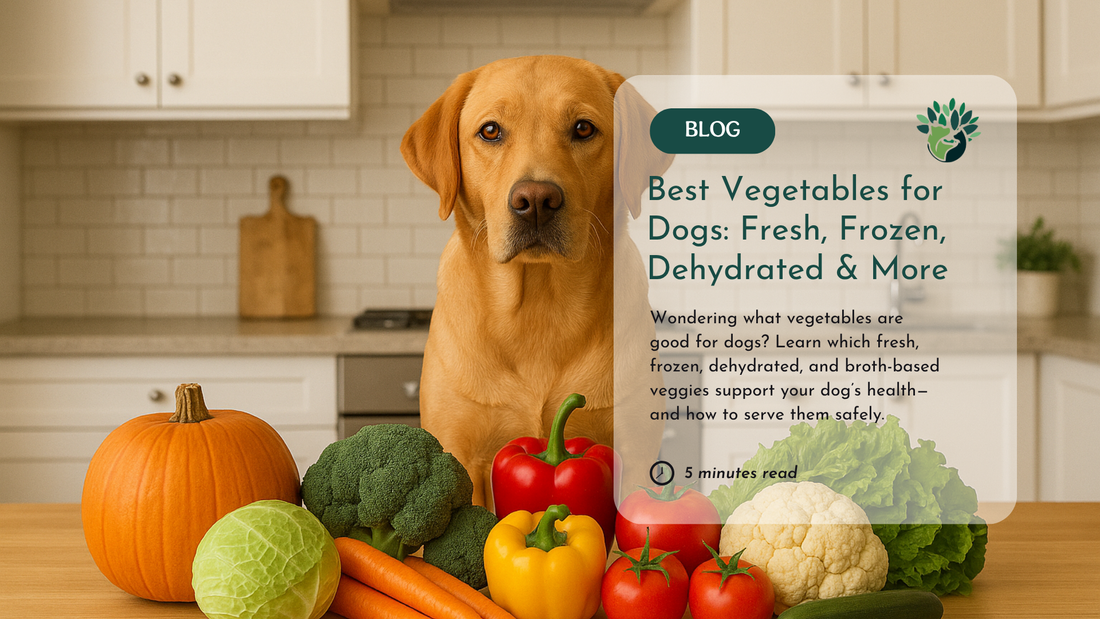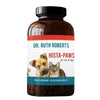When it comes to feeding your dog a healthy, balanced diet, vegetables are often overlooked—but they can be a powerful addition to your pet’s bowl. Whether served fresh, frozen, dehydrated, or in the form of oils and broths, the right vegetables can support digestion, boost immune function, and even help manage weight and inflammation.
In this blog, we’ll explore the best vegetables for dogs and how to serve them—covering green veggies, frozen and dehydrated options, vegetable oils, and vegetable broths. If you’ve ever asked, “What vegetables are good for dogs?”—you’re in the right place.
Are Vegetables Good for Dogs?
Yes, many vegetables are safe and beneficial for dogs when offered in moderation and prepared properly. While dogs are omnivores and primarily thrive on animal-based proteins and fats, they can digest certain vegetables and benefit from their fiber, phytonutrients, and antioxidants.
Remember, vegetables can be a beneficial addition to your dog's diet when fed appropriately, offering natural fiber that may help support digestion. They provide essential vitamins and minerals that contribute to overall wellness and can assist in hydration, particularly if the vegetables have high water content. Incorporating vegetables can also aid in maintaining a healthy weight and metabolism. Additionally, vegetables add variety and enrichment to your dog's meals, making feeding times more enjoyable.
Safe and Nutritious Vegetables for Dogs
Including vegetables in your dog's diet can provide essential vitamins, minerals, antioxidants, and fiber that support overall health and wellness. Here's a detailed look at some of the best vegetables for dogs, how they benefit your pet, and how to safely prepare them.
🥦 Green Vegetables
-
Broccoli: This nutrient-packed vegetable provides fiber for digestive support, antioxidants that help fight inflammation, and a significant dose of vitamin C, which strengthens your dog's immune system. Serve broccoli steamed or lightly cooked, and only in moderation since too much can cause digestive upset like gas.
-
Green Beans: A low-calorie, fiber-rich vegetable perfect for dogs on weight management plans. Green beans are filling yet gentle on digestion, making them ideal as healthy treats or meal toppers. You can offer green beans fresh, lightly steamed, or even frozen for a crunchy snack, always plain without added seasonings.
-
Zucchini: Easy on sensitive stomachs, zucchini is a great low-calorie source of dietary fiber, vitamin C, and potassium. It’s best served raw (grated or finely chopped) or lightly steamed, making it a versatile veggie that's gentle enough for regular feeding.
-
Kale: Known as a superfood, kale provides vitamins A, K, and C, along with minerals like calcium and magnesium. While beneficial in small quantities, kale contains compounds called isothiocyanates, which can be problematic if fed in large amounts, potentially causing gastric irritation. Steam or finely chop kale, serving occasionally rather than daily.
-
Spinach: This leafy green is rich in iron, antioxidants, vitamins, and minerals. Spinach is especially good for dogs needing nutritional support, such as seniors or dogs recovering from illness. However, spinach is high in oxalates, which could interfere with calcium absorption, so serve it lightly cooked and in moderation.
🥕 Root & Orange Veggies
-
Carrots: Carrots are crunchy, naturally sweet, and loaded with beta-carotene, fiber, and vitamin A. They make an excellent low-calorie snack for dogs of all ages. Offer raw carrot slices for dental benefits, or steam carrots to enhance digestibility, especially for smaller or senior dogs.
-
Sweet Potatoes: Another excellent source of dietary fiber and beta-carotene, sweet potatoes help support digestive health and are beneficial for dogs with sensitive stomachs. Serve them cooked, baked, or steamed—never raw, as raw sweet potatoes can be tough to digest. Sweet potatoes can also be dehydrated for chewy homemade treats.
🌱 Peas and Squash
-
Peas: Green peas contain protein, vitamins A, K, and B, as well as minerals like potassium and magnesium. They're also fiber-rich, aiding digestion and promoting fullness. Peas can be steamed lightly or served frozen for a refreshing snack—always plain, without added salt or butter.
-
Pumpkin: Famous for soothing upset stomachs, pumpkin is high in fiber and vitamin A, aiding digestive health and regularity. It’s particularly beneficial for dogs experiencing diarrhea or constipation. Use plain canned pumpkin puree (without spices or sweeteners) or freshly cooked pumpkin cubes as a meal enhancer or digestive supplement.
Frozen Vegetables for Dogs
Frozen vegetables are a convenient and budget-friendly way to feed your dog more whole foods. Most frozen veggies are flash-frozen at peak ripeness, which helps preserve nutrients. They’re safe for dogs as long as they’re plain—no sauces, salts, or seasonings.
Good frozen vegetable options:
-
Green beans
-
Carrots
-
Peas
-
Sweet potatoes (pre-cooked and diced)
-
Pumpkin (plain purée or cubes)
-
Cauliflower
You can thaw and lightly steam frozen vegetables before feeding, or blend them into your dog’s food. Frozen carrots or green beans also make great crunchy treats, especially in warm weather or for teething puppies.
Dehydrated Vegetables for Dogs
Dehydrated vegetables are veggies that have had nearly all of their water content removed through a drying process. This is typically done using a food dehydrator, low-temperature oven drying, or air-drying. Removing moisture significantly extends shelf life, preserves nutrients, and makes them convenient to store and use.
Benefits of dehydrated veggies:
-
Long shelf life
-
Lightweight and travel-friendly
-
Easy to portion
-
Great for making homemade treats or rehydrating with meals
Popular dehydrated veggies for dogs:
-
Carrots
Sweet potatoes -
Pumpkin
-
Beets
-
Parsnips
-
Leafy greens like kale or spinach
Note: Always rehydrate dehydrated vegetables with warm water or bone broth before feeding, especially if you’re using them in meals. This supports digestion and hydration.
Vegetable Oils for Dogs
Certain vegetable-derived oils can support your dog’s health, especially when it comes to skin, coat, and inflammation.
Coconut Oil
Coconut oil contains medium-chain fatty acids (MCFAs) that provide energy, support brain function, and offer antimicrobial benefits for skin health. However, it's calorie-dense and high in saturated fat, so use sparingly. Introduce slowly, starting with about ¼ teaspoon per 10 lbs of body weight, and avoid use if your dog has pancreatitis or digestive sensitivities.
Sunflower Oil
Sunflower oil provides omega-6 fatty acids, supporting skin and coat health. But omega-6 can encourage inflammation if not balanced by omega-3 fatty acids (like fish oil). Always choose cold-pressed, unrefined sunflower oil, and balance it with omega-3 sources.
Flaxseed Oil
Flaxseed oil is rich in plant-based omega-3 (ALA), offering anti-inflammatory benefits. However, dogs don't easily convert ALA into DHA and EPA, the most beneficial forms of omega-3s found in fish oils. Flaxseed oil is best used alongside marine sources of omega-3s rather than as a primary supplement.
Key Considerations:
-
Use Sparingly: Oils are high in calories, so measure carefully to avoid weight gain.
-
Quality Matters: Opt for cold-pressed, unrefined, organic oils.
-
Rotate Oils: Rotating between oils can maximize nutritional benefits and reduce risk of imbalances.
Vegetable Broth for Dogs
Vegetable broth is a gentle, hydrating way to deliver nutrients and flavor—especially for picky eaters or dogs with sensitive stomachs.
Benefits of vegetable broth:
-
Encourages hydration
-
Adds trace minerals like potassium and magnesium
-
Can soothe upset stomachs
-
Great base for rehydrating dry food or adding to rice or stews
Homemade vegetable broth is a fantastic way to enhance your dog’s meals, providing hydration, flavor, and nutrients without additives or excess sodium commonly found in store-bought products. When preparing vegetable broth for your dog at home, always choose pet-safe ingredients, avoiding toxic vegetables such as onions, garlic, leeks, and chives. If you'd like to learn more about making nutritious and dog-friendly vegetable broth at home, check out our detailed blog on vegetable broth for dogs for helpful tips and guidance!
Vegetables to Avoid
While many vegetables are safe, some can be harmful or even toxic to dogs:
🚫 Onions, garlic, chives, and leeks – toxic to red blood cells
🚫 Raw potatoes – contain solanine, which is harmful
🚫 Tomato leaves and stems – contain solanine
🚫 Avocado – contains persin, which can upset digestion
🚫 Mushrooms (wild or unknown origin) – can be toxic
How Much Vegetables Should You Feed?
The amount of vegetables you should feed your dog depends on their size, dietary needs, and how accustomed they are to eating vegetables. Generally, vegetables should make up about 10-25% of your dog’s overall diet, depending on their individual health and nutritional requirements. For example, a medium-sized dog might start with 2-3 tablespoons of cooked or pureed vegetables per meal and adjust from there based on their tolerance and preferences
If you’re using a whole-food-based recipe like The Original CrockPet Diet, vegetables are carefully balanced to support your dog’s individual constitution, health status, and taste preferences.
Final Thoughts
Adding vegetables to your dog’s diet—whether fresh, frozen, dehydrated, or in the form of oils and broths—can provide natural support for digestion, immunity, hydration, and overall wellness. Remember, moderation and careful preparation are key. Always choose pet-safe veggies, introduce them gradually, and observe your dog’s response.
For personalized guidance on canine nutrition and holistic pet health, consult with a certified Holistic Pet Health Coach & Canine Nutritionist who can tailor recommendations specifically to your dog's unique needs. Ready to start creating nutritious, balanced meals at home? Check out The Original CrockPet Diet Recipe and discover how easy it can be to support your pet's health, because your dog’s best health truly starts in the bowl!















